Table of Contents
Introduction
Can you go without caffeine for a day? In this blog, we gonna see how caffeine affects sleep with some tips at the end.
Now let’s see how Caffeine affects adenosine which makes us sleep.
Caffeine and Adenosine
Caffeine is a drug, that stimulates our brain and nervous systems and keeps us alert. The FDA has stated that for healthy adults, 400mg of caffeine per day is safe to consume. However, excessive or prolonged consumption of caffeine can affect our health, including the heart.
| If you are a pregnant or breastfeeding woman, consuming no more than 200mg of caffeine per day is considered safe. |
Source of caffeine: Caffeine is found in coffee, cocoa beans, green tea, tea, chocolates, energy drinks and bars, soft drinks, soda, chewing gums, ice-creams, cakes and also in some medicines like painkillers, weight loss supplements, headache medicines etc.
| Even though caffeine has some benefits, I still advise you to avoid products containing caffeine. Research shows that caffeine can raise blood pressure and few studies show that excessive and prolonged consumption may lead to kidney dysfunction mostly in people with digestive issues. |
A brief story about Adenosine and Sleep
The food we eat is converted into ATP (Adenosine triphosphate), an energy warehouse. When ATP breaks, energy is released which is required for us to function. In the end, Adenosine is released from the ATP.
The longer we stay awake, our body utilizes more energy and produces more adenosine. Since our brain uses more energy than the rest of the body, more adenosine builds up in the brain. That excess adenosine binds to the adenosine receptor and reduces the brain’s activity and makes us sleep.
Adenosine receptor? What does it mean?
Role of Receptor: Every cell in our body has numerous types of receptors inside the cells and on the cell wall. They receive signals from outsiders like hormones, neurotransmitters, ions etc. and deliver them inside the cells. As a response to these signals, our cells modify their functions.
Receptors are like locks; they vary in shape and only receive the substance that fits their specific shape. This means that the adenosine receptor only accepts adenosine because it fits the shape of the receptor-like puzzle.
– Caffeine occupies Adenosine’s place: Caffeine has the same structure as adenosine, which means caffeine can bind to the adenosine receptor. As caffeine is a stimulant, it will keep us awake whereas adenosine has the opposite effect which makes us sleep.
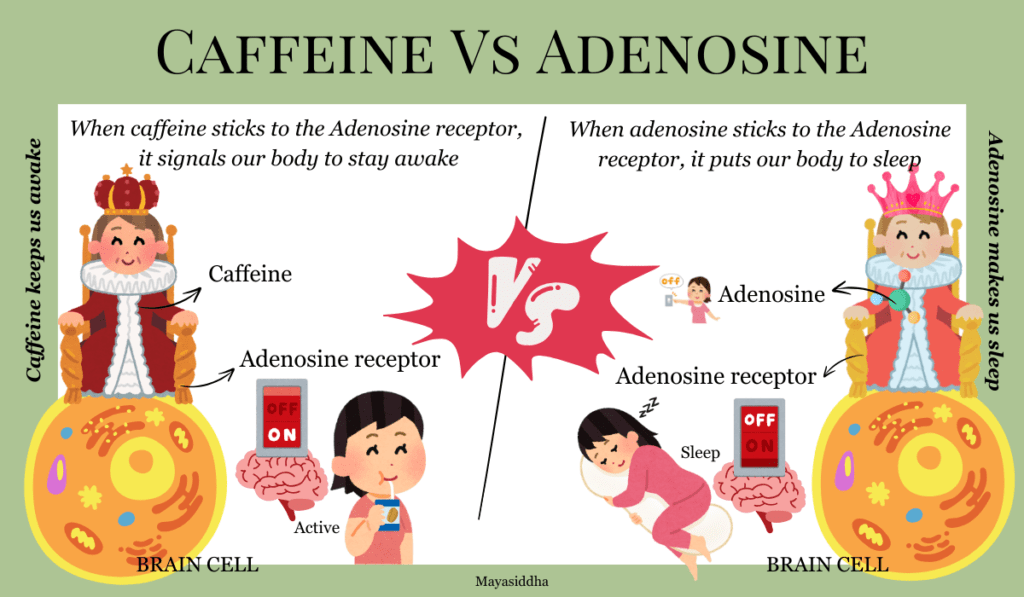
When taking coffee, tea, drinks, or chewing gum, some people find that their drowsiness goes away and they feel fresh and active. Because caffeine present in those items binds to adenosine receptors and keeps you awake by preventing adenosine from making you feel sleepy.
If caffeine sits in the adenosine place, what will happen to adenosine?
Does caffeine affect sleep ?
The battle between caffeine and adenosine: The adenosine will wait until the caffeine is eliminated from the body. But the sad thing is, our body takes 5 – 7 hours to eliminate half of the caffeine, which means you will be alert for another 5 – 7 hours. Until then, the adenosine will keep on building up and waiting impatiently for the caffeine to leave the place.
However, the caffeine half-life varies from person to person ranging from 1.5 hours to 10 hours. Other factors that influence its degradation period include age, digestive capacity, and the intake of caffeine-related products after food etc.
Once caffeine is eliminated, adenosine will be like “pull the plug”. The adenosine will rush to its place and urge us to sleep, which means we can’t hold back sleep anymore.
| Tips: Stop taking caffeine-related items after 12 pm to get a good night’s sleep. |
What happens when adenosine builds up?
Usually, our body quickly converts adenosine into other substance to prevent dangerous accumulation.
But until caffeine is present, adenosine will accumulate in our bodies. The excessively accumulated adenosine can weaken essential cell functions, nerve functions and immune system functions which can lead to various health issues.
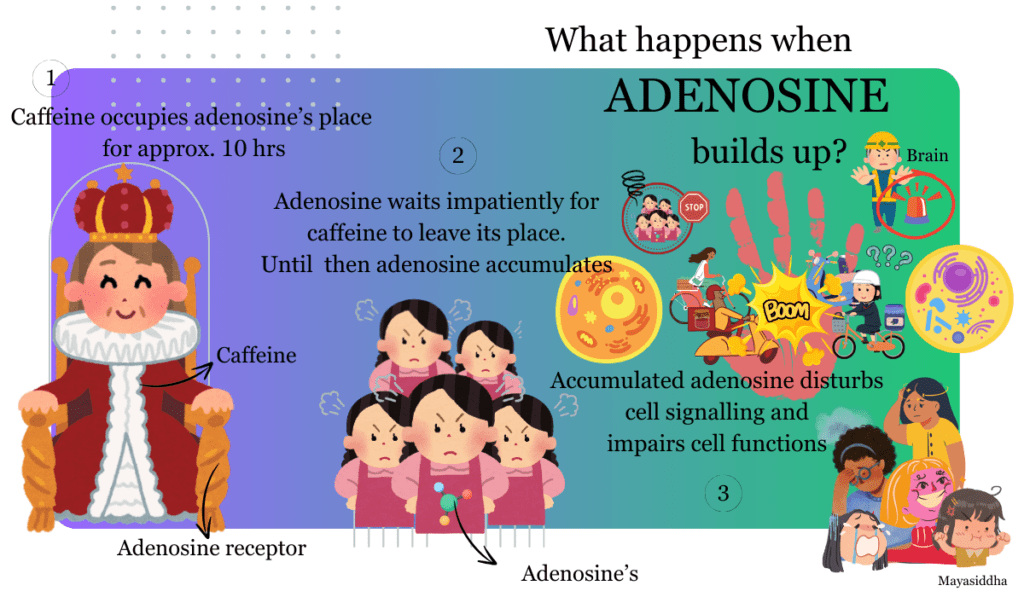
| Don’t take medicines and products containing caffeine together. Caffeine interacts with certain medicines. They increase or decrease the medicine’s absorption and elimination period which can cause serious side effects. |
Summary
Caffeine has the same structure as adenosine. So, caffeine replaces adenosine by binding to the adenosine receptor and keeping us awake. Caffeine roughly takes around 10 hours to be eliminated from the body. Until then adenosine will accumulate and wait for caffeine to leave its place. As soon as caffeine leaves, adenosine binds to the adenosine receptor and makes us sleep. The problem is if too much adenosine accumulates, it can lead to various health issues.
Tips
- Don’t take caffeine-related products on an empty stomach, as it can cause acidity.
- Don’t take caffeine-related products after 12 pm and not more than one cup a day.
- Don’t take it with medicines to avoid the harmful side effects.
- Avoid caffeine-related products if you have digestive issues.
- Prolonged and excessive intake of caffeine is shown to develop mild to serious health issues like anxiety, dehydration, headaches, trouble sleeping, high blood pressure etc.
- Don’t mix caffeinated energy drinks with alcohol to avoid alcohol poisoning.
- Don’t suddenly stop taking caffeine-related products to avoid withdrawal effects. Reduce your caffeine intake gradually and tapering is the right way.
- How to taper: For the first week, limit your caffeine intake to 5 days per week; the following week, take it on alternate days; for the third week, limit it to just 2 days per week; and for the fourth week, completely cut it out.
Reference
- Gardiner, C., Weakley, J., Burke, L. M., Roach, G. D., Sargent, C., Maniar, N., Townshend, A., & Halson, S. L. (2023). The effect of caffeine on subsequent sleep: A systematic review and meta-analysis. Sleep medicine reviews, 69, 101764. https://doi.org/10.1016/j.smrv.2023.101764.
- Moradi, A., Ghahremaninejad, F., Hoseini, E., Talebi, M. N., Lohrasbi, S., Farahimanesh, S., Nami, M., Khazaei, H., Kazemi, K., & Mohammadi, M. (2022). The effectiveness of caffeinated chewing gum in ameliorating cognitive functions affected by sleep deprivation. Sleep Science, 15(2), 216-223. https://doi.org/10.5935/1984-0063.20220044.
- Institute of Medicine (US) Committee on Military Nutrition Research. Caffeine for the Sustainment of Mental Task Performance: Formulations for Military Operations. Washington (DC): National Academies Press (US); 2001. 2, Pharmacology of Caffeine. Available from: https://www.ncbi.nlm.nih.gov/books/NBK223808/.
- Evans J, Richards JR, Battisti AS. Caffeine. [Updated 2023 Jun 8]. In: StatPearls [Internet]. Treasure Island (FL): StatPearls Publishing; 2024 Jan-. Available from: https://www.ncbi.nlm.nih.gov/books/NBK519490/.
- Temple, J. L., Bernard, C., Lipshultz, S. E., Czachor, J. D., Westphal, J. A., & Mestre, M. A. (2017). The Safety of Ingested Caffeine: A Comprehensive Review. Frontiers in Psychiatry, 8. https://doi.org/10.3389/fpsyt.2017.00080.
- Ferré, S. (2011). Alcohol and Caffeine: The Perfect Storm. Journal of Caffeine Research, 1(3), 153-162. https://doi.org/10.1089/jcr.2011.0017.
- Morgan, S., Koren, G., & Bozzo, P. (2013). Is caffeine consumption safe during pregnancy? Canadian Family Physician, 59(4), 361-362. https://www.ncbi.nlm.nih.gov/pmc/articles/PMC3625078/.
- Nurminen, M., Niittynen, L., Korpela, R., & Vapaatalo, H. (1999). Coffee, caffeine and blood pressure: A critical review. European Journal of Clinical Nutrition, 53(11), 831-839. https://doi.org/10.1038/sj.ejcn.1600899.
- Bakker, R., Steegers, E. A., Raat, H., Hofman, A., & Jaddoe, V. W. (2011). Maternal caffeine intake, blood pressure, and the risk of hypertensive complications during pregnancy. The Generation R Study. American journal of hypertension, 24(4), 421–428. https://doi.org/10.1038/ajh.2010.242.
- Tofovic, S. P., & Jackson, E. K. (1999). Effects of long-term caffeine consumption on renal function in spontaneously hypertensive heart failure prone rats. Journal of cardiovascular pharmacology, 33(3), 360–366. https://doi.org/10.1097/00005344-199903000-00003.
- Ruiz, V., Toledo, E., Corella, D., Castañer, O., Martínez, J. A., M., Á., Wärnberg, J., Vioque, J., Romaguera, D., Estruch, R., Tinahones, F. J., Lapetra, J., Tur, J. A., Sánchez, V. M., Pintó, X., Vidal, J., Vázquez, C., Daimiel, L., Villa, T. F., . . . Fitó, M. (2021). Consumption of caffeinated beverages and kidney function decline in an elderly Mediterranean population with metabolic syndrome. Scientific Reports, 11(1), 1-13. https://doi.org/10.1038/s41598-021-88028-7.
- Jim Oldfield. (2023 January 31). Link between coffee and kidney disease may depend on genetic variant, study finds. https://www.utoronto.ca/news/link-between-coffee-and-kidney-disease-may-depend-genetic-variant-study-finds.
- Garcia-Gil, M., Camici, M., Allegrini, S., Pesi, R., & Tozzi, M. G. (2021). Metabolic Aspects of Adenosine Functions in the Brain. Frontiers in Pharmacology, 12. https://doi.org/10.3389/fphar.2021.672182.
- Antonioli, L., Fornai, M., Blandizzi, C., Pacher, P., & Haskó, G. (2018). Adenosine signaling and the immune system: When a lot could be too much. Immunology Letters, 205, 9-15. https://doi.org/10.1016/j.imlet.2018.04.006.
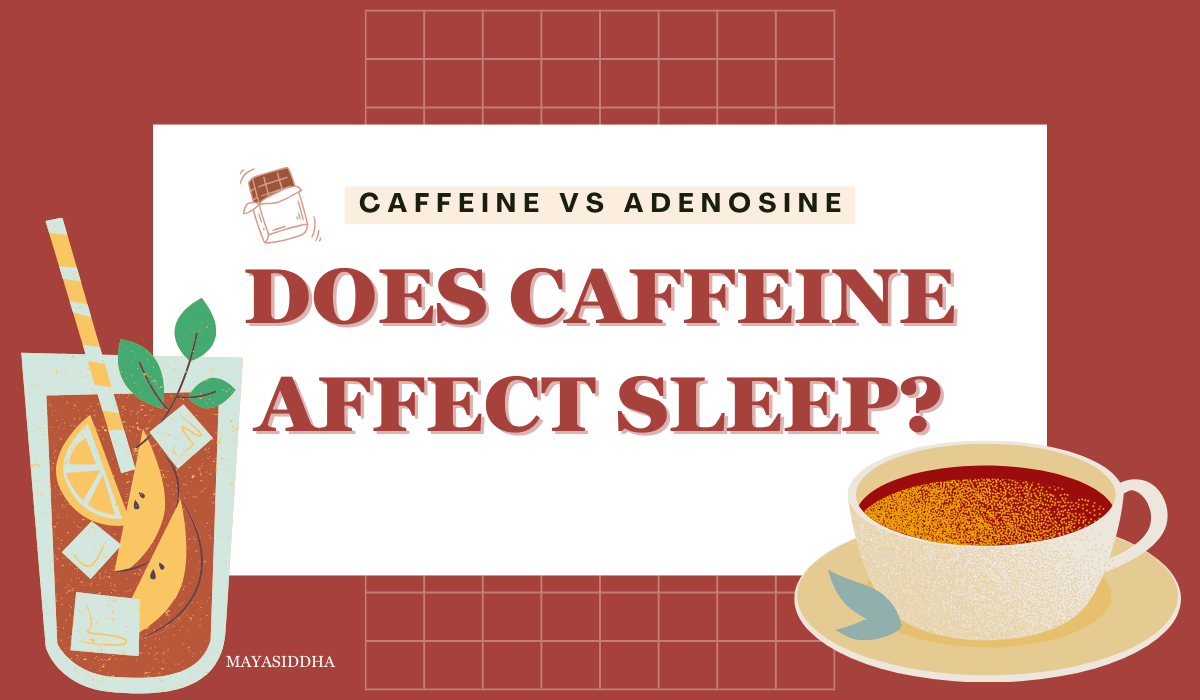

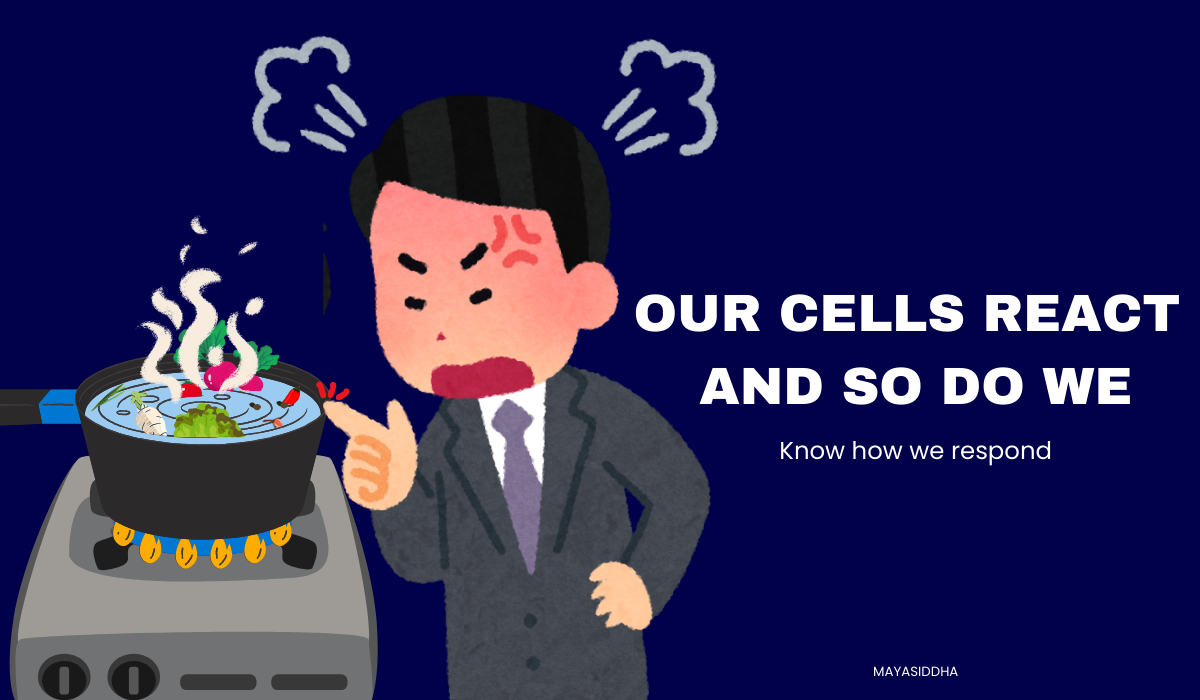

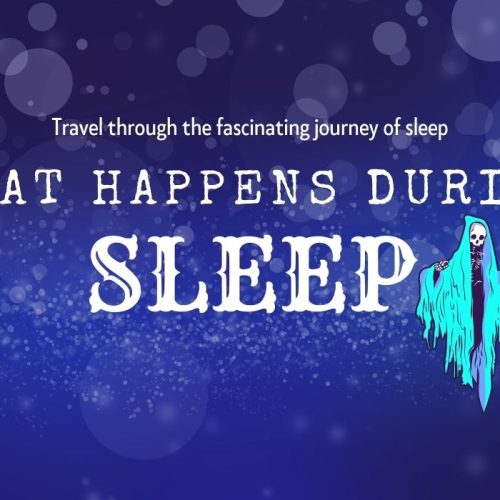
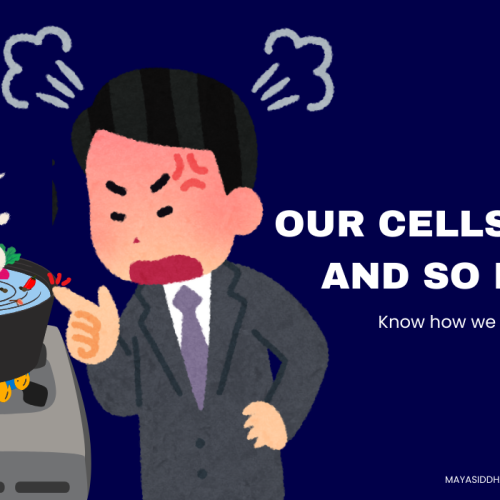
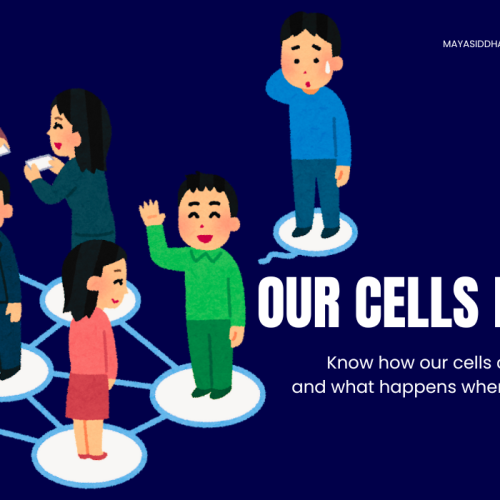
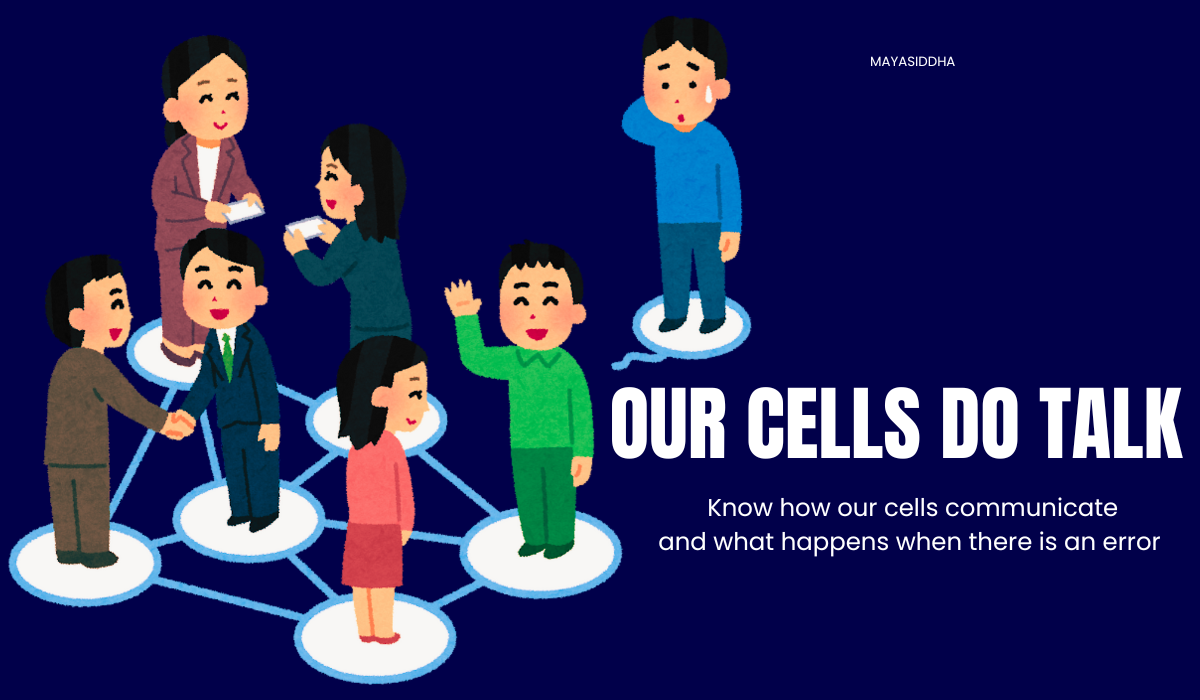
8 Comments
I am genuinely thankful to the owner of this website for sharing his brilliant ideas. I can see how much you’ve helped everybody who comes across your page.
Thanks a lot for your thoughtful appreciation. I am glad that you found it useful and it’s the least i could do.
This blog is really helps me a lot
Thank you sir. Iam happy that this content helped you in some way.
Good evening, doctor. I have also decided to avoid caffeine products and educate my circles about this very useful information. Thank you very much.
Thank you sir. Iam glad that this content lead you to make a good decision.
I decided to avoid caffeine products and will educate others.
Thank you making this decision sir. It’s good for your health and others too.